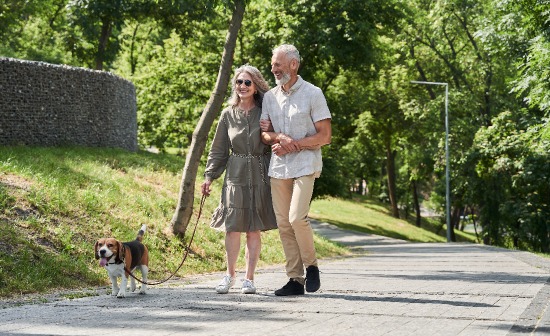“Self-care is a five-minute break. It’s taking that fresh breath outside. It’s free, and it doesn’t take a lot of time and doesn’t require lots of money.”—Elle Thorne, Senior MindStep Coach, Australian Unity
Key points
- Self-care means looking after our health and wellbeing, including our physical and mental health, relationships or community connectedness.
- While self-care looks different to everyone, it should occur regularly and be a conscious act.
- Self-care doesn’t need to be expensive or time-consuming; even a five-minute break, a cup of tea, or practising mindfulness can provide benefits.
During the past couple of years—and particularly in the depths of the COVID-19 pandemic—self-care has regularly appeared in the news, and the hashtag #selfcare has trended thanks to the plethora of artful images uploaded by social media influencers. Self-care, it seems, is having a moment.
But is self-care really about lighting a scented candle and slipping into a hot bath?
Here we talk to the experts about what self-care really means, its benefits and how to fit it into our busy lives.

What is self-care?
Elle Thorne, Senior MindStep Coach at Australian Unity, says self-care is all about caring for our own “physical health, mental health, emotional health, as well as spiritual health”. It’s also characterised by regularity—ideally, it’s a daily practice—and taking time away from everyday life. Elle says it should make us feel “re-energised or recharged” and “able to continue on with our daily tasks”.
Dr Laura Kampel, Head of Clinical Services at the Black Dog Institute, also emphasises regularity as an essential feature of self-care.
“It’s a conscious act. Self-care is activities or practices that we deliberately choose to promote our health and wellbeing across different domains. It could be our physical health, our psychological and emotional health, our social connectedness or relationships, our spiritual health and our health as a professional, or the way we see ourselves operating in the workplace.”
How do we incorporate self-care into our lives?
Okay, so we now better understand what self-care is—but how do we start putting this knowledge into practice?
Self-care looks different for everyone, but the first thing we need to do is to look inwards. “Take a look at your individual core needs, and how you can meet these across different domains. The second step is trying to find coping strategies or self-care practices that can bring about an improvement or a change in your wellbeing,” says Laura.
So, for example, one core need might be to get adequate sleep so you wake up feeling refreshed. Review how you are currently looking after this need and the new self-care practices you could do to improve things in this area. For example, you could try changing your bedtime schedule, drinking some calming tea before bed, reading instead of scrolling through social media, and getting out of bed at the same time every morning.

As Laura says: “There might be things that you are already doing, or there may be other things that you want to try and incorporate into your life. Start with something small rather than tackling the most challenging thing, then weave it into your daily or weekly routine.”
Elle says self-care can be so simple that it may even “sound silly” at first. “Self-care, for me, is a tea break. It’s being present when I’m sipping the tea, noticing the smell, the colour, noticing the temperature of the tea.” By being present, we ground ourselves in the “now” rather than “past negative events or future uncertainties, which can be a scary place to be”.
It can also mean simply taking time away from social media. “We are living in an age of technology, where information is flowing in thousands of forms and filling our brains. We are constantly feeling stressed out and pressured by all this information. We need to take time off to recharge,” says Elle.
Why bother with self-care?
Laura says that self-care is a protective practice: “It often gives your body and mind a chance to reset, rejuvenate and rest. This can protect against mental ill-health, like depression, anxiety, stress and burnout.”
But Laura suggests there’s even more reason to start incorporating self-care into your day. “Self-care can help us experience deeper pleasure and more positive emotions, and give us energy and vitality. It can be a way of staying resilient.”
And the benefits continue to flow. Self-care can help us live longer and happier lives, says Laura. “Research supports the fact that engaging in healthy practices, such as exercising and eating well, contributes to longevity. But more important than longevity, or as important, is quality of life.”

So, what’s with the scented candle?
While it can feel luxurious to have a facial, get our nails done or light a beautifully scented candle, these things are not self-care. Advertising might have us believe we need these things to feel better, but self-care generally comes without the price tag, says Elle.
“Facials, nails and candles are good, but it’s another level and we may not have money for these things. Self-care is a five-minute break. It’s doing meditation and practising gratefulness, acknowledging what we have or what’s going well in our lives. It’s taking that fresh breath outside. It’s free, and it doesn’t take a lot of time and doesn’t require lots of money.”
Laura says it goes back to that basic definition of self-care as a daily or weekly practice. A scented candle might be lovely in helping us to unwind, but it only lasts as long as that candle burns. True self-care is regular and creates an enduring impact.
There’s no need to throw out the candles, though, Laura says. “Even though there is a difference between a true behaviour change versus something that’s a temporary pleasure, having a combination of those things is a wonderful idea.”


